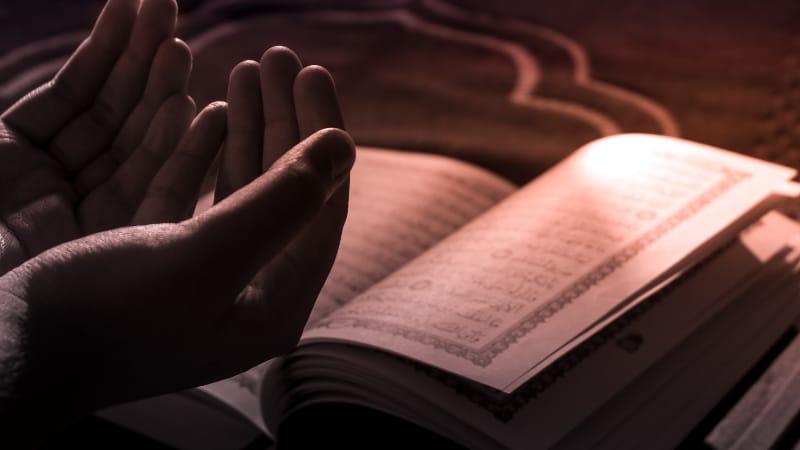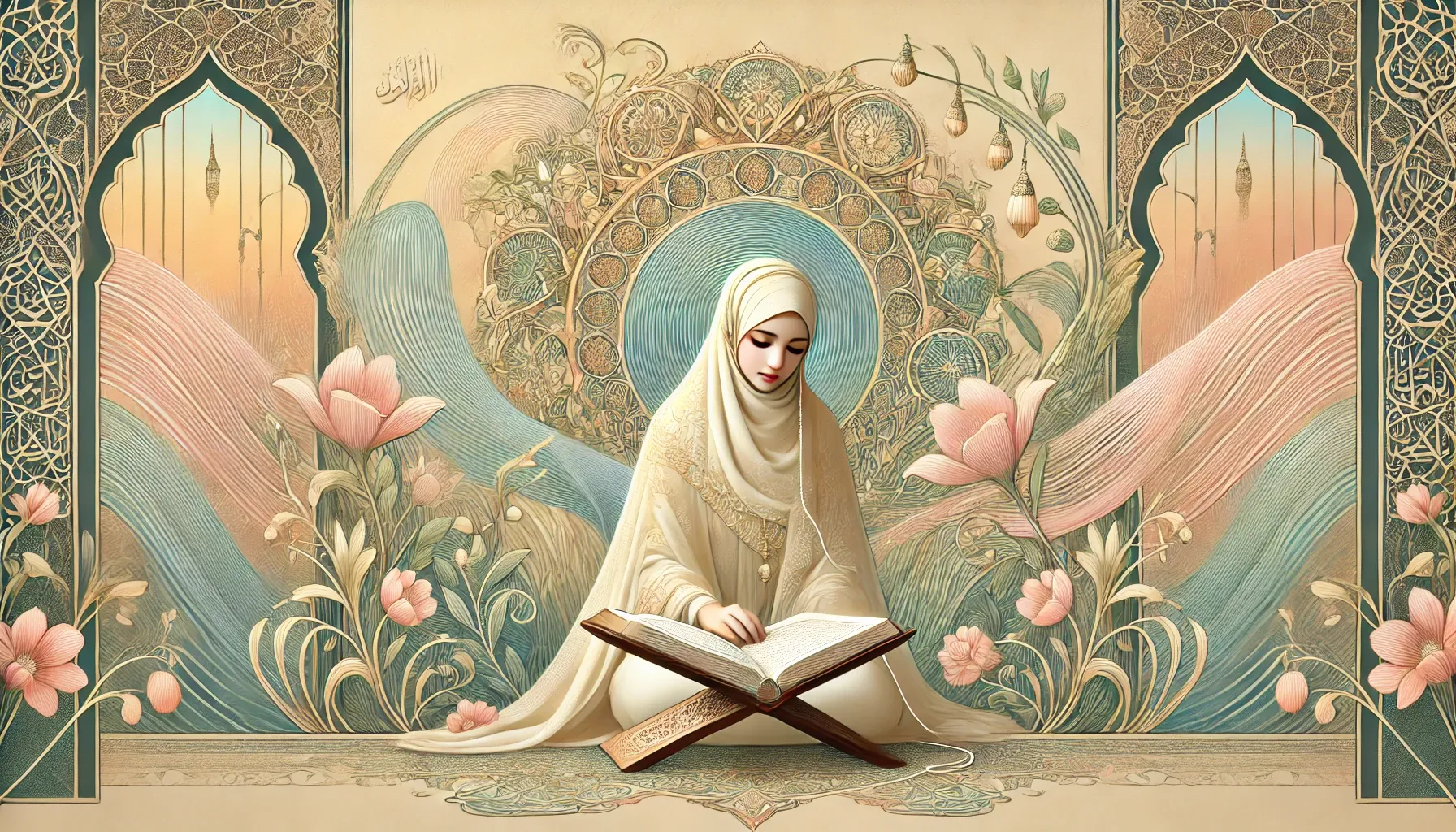Spiritual Energy In Islam: How To Strengthen Your Spiritual Energy

In Islam, spiritual energy is the inner strength that connects a person to Allah. It helps believers stay calm, strong, and focused, especially when facing life's challenges. This energy is not just about being tough in hard times but also about keeping a peaceful heart and mind through a strong connection to Allah.
In today's world, many people are paying more attention to their spiritual well-being. With all the stress, negativity, and distractions around us, it’s important to protect and build our spiritual energy.
By praying, remembering Allah, and following Islamic teachings, Muslims can stay positive and face difficulties with confidence.
This blog post will explore what spiritual energy means in Islam and how it can be nurtured to bring peace and strength to everyday life.
Table of Contents
Understanding Spiritual Energy In Islam
In Islam, spiritual energy refers to the inner strength that helps a believer stay connected to Allah and live a balanced life.
This energy is not something physical, but rather, it comes from having a strong faith, trust in Allah, and the practice of Islamic teachings. It’s about keeping the heart pure and calm, especially when facing difficulties.
The soul, or nafs, plays a key role in spiritual energy. The nafs is the inner part of a person that influences thoughts, actions, and emotions. It can either guide a person towards goodness or lead them to negative behavior, depending on how it is nurtured.
Islam teaches that the nafs can be purified through worship, remembrance of Allah, and striving for good deeds. As the nafs grows spiritually, it becomes more aligned with the will of Allah, helping to increase spiritual energy.
A strong connection with Allah is the foundation of spiritual energy in Islam. By regularly praying, seeking forgiveness, and remembering Allah through dhikr (remembrance), a believer strengthens this bond.
The closer one is to Allah, the more spiritual energy they feel, which helps them overcome challenges and stay positive in life.
How Spiritual Energy Relates To Inner Peace

In Islam, inner peace, or sakinah, is a state of calmness and tranquility that comes from being connected to Allah. Sakinah is a deep sense of peace that settles in the heart and mind, helping a person stay balanced even during tough times.
This peace is a direct result of nurturing spiritual energy and following the teachings of Islam. When a person strengthens their relationship with Allah, they naturally experience sakinah—a peace that goes beyond external circumstances and brings comfort to the soul.
Faith (iman) and trust in Allah (tawakkul) are central to maintaining spiritual energy and peace.
Iman is the belief in the unseen and the trust that Allah knows what is best for us. Tawakkul is putting your trust in Allah and relying on Him, while also taking the necessary steps in life.
When a person truly believes that Allah is in control and trusts His plan, it helps calm the mind and reduce anxiety. This deep faith and trust allow a person to stay focused on their spiritual path and feel at peace, no matter what challenges they face.
One of the most powerful ways to calm the soul and recharge spiritual energy is through dhikr, or the remembrance of Allah. Dhikr involves saying simple phrases like "SubhanAllah" (Glory be to Allah), "Alhamdulillah" (All praise be to Allah), and "Allahu Akbar" (Allah is the Greatest).
These words of remembrance help quiet the mind, strengthen the heart, and bring a sense of tranquility. Through regular dhikr, a believer connects with Allah, cleanses their heart, and maintains their spiritual energy, allowing them to face life’s challenges with peace and positivity.
Read Also:

Protecting Your Spiritual Energy From Negativity
Negative influences, whether from the outside world or from within, can drain a person’s spiritual energy and harm their connection to Allah.
These negative forces can come in many forms—stress, envy, harmful thoughts, toxic relationships, or bad company. When exposed to negativity, a person's heart and mind can become clouded, making it difficult to maintain peace and spiritual strength.
To protect your spiritual energy, it’s essential to take steps to shield yourself from both external and internal negativity.
Seeking refuge in Allah is one of the most effective ways to protect your spiritual energy. Islam teaches that when faced with negative or harmful situations, you can seek protection through prayer and asking Allah for help and guidance.
By reciting prayers like "A'udhu billahi min ash-shaytan ir-rajim" (I seek refuge in Allah from the accursed devil), you can protect yourself from harmful influences and bring peace to your heart.
Staying connected to the Qur'an and Sunnah is another key way to safeguard your spiritual energy. Regular reading and reflecting on the Qur'an help remind you of Allah’s mercy, wisdom, and guidance.
The teachings of the Prophet Muhammad (PBUH), found in the Sunnah, offer practical advice for living a spiritually strong life. By following these divine sources, you strengthen your faith and shield yourself from negativity.
Additionally, avoiding harmful environments and toxic relationships plays a major role in protecting your spiritual health. Being around people who spread negativity, gossip, or bad behavior can drain your energy.
Islam encourages believers to choose their companions wisely, as they can either lift you up or bring you down. Staying away from toxic relationships and seeking out those who support your faith and well-being is important for preserving spiritual strength.
Read Also:

Practical Tips To Strengthen Spiritual Energy

Building and strengthening spiritual energy requires regular practice and dedication to acts of worship and positive habits that align with Islamic teachings. Here are some practical steps to help nurture and recharge your spiritual energy:
1. Regular Acts Of Worship
- Salah (Prayer)
Salah is the most important act of worship in Islam, and it serves as a direct connection between the believer and Allah. The five daily prayers (Fajr, Dhuhr, Asr, Maghrib, and Isha) offer spiritual grounding throughout the day.
Each prayer brings peace to the heart, cleanses the soul, and reminds the believer of their purpose in life. The act of bowing and prostrating during prayer is also a reminder of humility and submission to Allah, helping to strengthen spiritual energy. - Fasting (Sawm)
Fasting during the month of Ramadan is a way to purify both the body and soul. During fasting, Muslims abstain from food, drink, and other distractions to focus on their relationship with Allah.
This physical act of restraint enhances spiritual discipline and reminds believers to detach from worldly desires, boosting spiritual energy. Fasting also fosters empathy for the less fortunate and helps develop patience, which in turn strengthens one’s connection to Allah. - Charity (Zakat)
Charity plays a crucial role in cleansing and renewing spiritual energy. By giving to those in need, Muslims purify their wealth and increase their blessings.
Zakat, the obligatory form of charity, is a means to help others while also purifying the soul. Giving charity helps develop a sense of gratitude and reduces attachment to material wealth, which can increase spiritual strength and positivity.
2. Dhikr And Reflection
- Remembrance of Allah (Dhikr)
The practice of dhikr involves remembering Allah through repeated phrases like "SubhanAllah" (Glory be to Allah), "Alhamdulillah" (All praise be to Allah), and "Allahu Akbar" (Allah is the Greatest).
These simple words help keep the heart focused on Allah and cleanse the mind from negative thoughts. Regular dhikr helps increase spiritual power, calm the soul, and protect oneself from external distractions. It is a powerful way to stay grounded and recharge your spiritual energy. - Meditation and Reflection (Tadabbur)
Islam encourages reflection on the signs of Allah in the world around us, including the beauty of nature, the teachings in the Qur'an, and the lessons from the life of Prophet Muhammad (PBUH).
Tadabbur, or deep reflection, is an essential practice for strengthening spiritual energy. By thinking deeply about the words of the Qur'an and how they apply to our lives, believers develop a deeper connection to Allah, foster inner peace, and strengthen their spiritual resolve.
Read Also:

3. Maintaining A Positive Mindset
- Gratitude (Shukr)
Practicing gratitude, or shukr, is essential for maintaining spiritual energy. Being thankful for Allah’s blessings, both big and small, increases positivity and contentment.
The act of regularly expressing gratitude helps shift the focus from what is lacking in life to what is abundant, uplifting the spirit and building inner strength. Gratitude reminds believers that Allah’s mercy and blessings are constant, regardless of circumstances. - Patience (Sabr)
Sabr, or patience, is an important virtue in Islam that helps maintain spiritual strength. Life can be full of challenges and difficulties, but patience teaches a person to remain calm and steadfast in the face of hardship.
By practicing patience, believers show trust in Allah’s wisdom and plan. Patience prevents negative emotions like frustration and anger from overpowering, helping to preserve spiritual energy and foster resilience.
Healing And Restoring Spiritual Energy

At times, we may feel spiritually drained or disconnected from our faith. This can be due to external pressures, personal challenges, or simply feeling distant from Allah.
When spiritual energy is depleted, it is important to take steps to renew and restore it. Islam provides several practices for spiritual renewal and healing, allowing believers to reconnect with Allah and recharge their inner strength.
1. Practices For Spiritual Renewal When Feeling Drained
When feeling spiritually weak or disconnected, it is essential to return to the basics of worship and self-care. Engaging in acts of worship like Salah (prayer), dhikr (remembrance of Allah), and reciting the Qur’an can help to restore spiritual energy. These practices create a direct connection to Allah, which calms the heart and uplifts the soul.
Additionally, taking time for reflection and self-awareness (tadabbur) helps to gain perspective on life’s challenges. Reflecting on Allah’s mercy, remembering past blessings, and focusing on gratitude can shift one’s mindset and revitalize spiritual energy.
2. The Power Of Dua And The Healing Properties Of The Qur’an
One of the most powerful tools for restoring spiritual energy is dua (prayer). When feeling drained, turning to Allah with sincere prayers is an act of trust and reliance on His mercy.
Allah encourages His believers to ask for help and guidance through dua. Making heartfelt supplications during times of difficulty can bring comfort to the soul and help restore a sense of spiritual peace.
The Qur’an plays a central role in healing and restoring spiritual energy. It is not just a book of guidance, but also a source of comfort and healing. In Surah Al-Isra (17:82), Allah says, "And We sent down in the Qur’an that which is a healing and a mercy to the believers."
Reciting and reflecting on the words of the Qur’an has the power to calm the heart, clear the mind, and restore spiritual strength. The Qur’an serves as a reminder of Allah’s presence and mercy, and its verses help heal emotional and spiritual wounds.
3. The Role Of Seeking Forgiveness (Tawbah) In Clearing Negative Energy
Sometimes, negative spiritual energy can accumulate due to sins, mistakes, or even negative thoughts.
In Islam, tawbah (seeking forgiveness) is a powerful way to clear this negative energy and restore spiritual peace. Allah is described as "The Most Merciful" and "The Oft-Forgiving," and He welcomes those who turn to Him with sincere repentance.
Seeking forgiveness through tawbah helps release guilt, anxiety, and shame, and brings a sense of purity to the soul. It allows the believer to renew their connection with Allah and lighten their spiritual load.
The act of tawbah is an essential part of spiritual healing, as it not only restores energy but also fosters a deep sense of humility, gratitude, and trust in Allah’s mercy.
In conclusion, healing and restoring spiritual energy in Islam involves returning to worship, engaging in dua, reflecting on the Qur’an, and seeking forgiveness.
Read Also:

Conclusion
Building and protecting spiritual energy is essential in Islam for maintaining a strong connection with Allah and navigating life’s challenges. Regular acts of worship, dhikr, and reflection help strengthen spiritual energy and bring inner peace.
By incorporating practices like prayer, charity, and seeking forgiveness, we can renew our spiritual energy daily. Staying connected to the Qur'an, seeking refuge in Allah, and engaging with the community also play key roles in this process.
Spiritual energy is an ongoing journey that requires constant attention and self-reflection. By making these practices a part of our daily lives, we can live a balanced, peaceful life while deepening our faith and connection with Allah.


